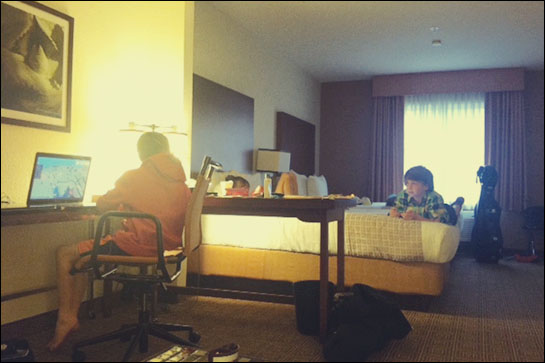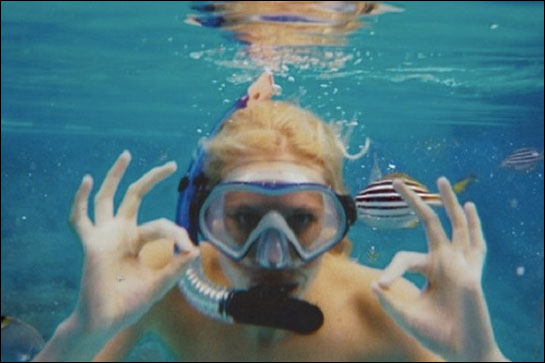Essential skill: recognizing real authority

In school the teachers get authority because they tell you they have authority. If the teacher tells you what to read, you read it. If the teacher tells you which sources are acceptable for your term paper, you use those sources. There is no room to question authority in the classroom because it would lead to chaos. And the number-one job of a teacher is to prevent the classroom from deteriorating into thirty kids overtaking one teacher.
We talk about authority a lot in my house because the kids need to know what sites are safe, what are fake, what sites they can spend money on and what sites are a scam. I teach them to look at the URL — the domain is what’s important, not the extension. I teach them to look for a way to contact people. But those are just beginner strategies. Learning to figure out who has authority and who is a poser – that’s a really important skill that takes practice.
Ironically, while school provides no ability to practice those skills, today’s workplace favors the person who is confident drawing their own conclusions about authority. And doing it fast. Because we are faced with decisions about who to trust online all the time. We are constantly gathering more information and turning into something new. The faster you can figure out the authority of the page you are looking at, the faster you can meet your goals.
Fact-based information. Information workers are paid to gather and synthesize information. Knowing where to look, how to get help, who to trust. These are skills you learn when you have to determine your own standards of authority.
The most obvious example of this is Wikipedia. For the most part, Wikipedia is reliable for academic topics. But did you know you can look at page rank to see an algorithm for authority? Did you know that you can look at the editorial process for a given entry in order to determine the strength of the page’s authority? (A lot of editorial contributions is good—it keeps people honest. But too many contributions will land the page on the Edit Wars List.)
School doesn’t teach these skills for sniffing out authority because then schools would have to admit that you don’t need teachers to spoon feed kids information—they can get it all online when they need it.
Photo-based information. Increasingly communication is visual. Generation Z uses emoji rather than words to convey deeper meaning than many people could get from words. Young people also use YouTube like Generation X uses Google, the ultimate source of everything you’d ever want to know.
But if communication is visual than how do you know which visuals have authority? The old rules don’t apply. Dutch twentysomething Zilla van den Born shows this in her clever depiction of a gap-year in Southeast Asia that never happened.

That’s a picture of her visiting a temple. And here she is in another cliched photo of exciting travels.

It’s just that her travels never happened. She is making fun of the idea that travel somehow makes a person. But she’s done it in such a realistic way that she is also making fun of how too often we take photos at face value.
Community. The best part of the Internet is the community behind it. At first blush, Reddit looks like something from another era with it’s non-user-friendly interface and lack of pictures. But Reddit is actually one of the most powerful communities online. Communities that look slick, like Glam, are actually more often only a shell for a community with nothing significant going on.
There are ways to judge communities. Dooce.com, for example, has so many hoops to jump through in order to participate that it’s gotta be good. Top 10 best dating sites ranks communities based on specific factors in the same way that you can get rankings for math sites or science sites. And social sharing is a quick way to find out if a so-called community is engaged. (That’s the metric I use here to decide if a post is a gem or a flop.)
Instruction style. Authority for teachers looks staid and organized and official in the standard classroom. But online, the most engaging courses are not from the big names in academia. In fact, Stanford is having younger, non-tenured professors teach online courses because too many famous professors are slow and dry on video. Online courses work best with a teacher who is fun and engaging, who are establishing authority from connecting with the students rather than speaking at them.
The up tight old-school measures of authority don’t work for us today. Not even at top universities. Which means that kids who go to school and pay attention to the teachers are, at some point, going to find themselves disconnected from the source of real authority and they will have to seek it out for themselves.
That’s why the real job of education should be to teach kids how to find their own sources of authority. Who do you trust? Who can you learn from? What sources speak to you in a way that engages your curiosity? These are the questions that kids need to ask so they are ready for the work world that awaits.

My youngest son, all ADHD and Asperger’s and, of course, all awesome, has a terrible time recognizing traditional authority.
Stupidest thing ever: when he was in middle school, there were up and down staircases. These staircases were plenty wide enough for two-way traffic. And he had to pass the down staircase on the way to the up staircase.
So he decided this was the dumbest rule ever and started taking whatever staircase was nearest to him. He got in trouble for it and dug in. It escalated; he ended up given a week of detention for it.
This was a moment for me to teach my son that traditional authority exists and its rules are sometimes arbitrary — and that when that authority has power over you, you have to really think through what you want: your way, or a peaceful life.
I told my son that, if I were him, I’d choose peace in this case. I encouraged him to continue to think that this was a dumb rule, and to feel frustrated by it — but to obey it, because if he did, five years from now this would be an amusing, eye-rolling story, rather than something fraught with ugly memories.
I also told him that a day is coming when he can choose his own authority, and to hang on until then.
Thanks for this one. I read them all, this one just helped me put a title to something I have had the bits and pieces in my mind but never organized. Since my son started going to a formal school he has shifted from a child who unknowingly assessed adults in terms authority to this idea of all adults have inherent authority over him. I find myself struggling with undermining the staff at his school and helping him retain and exercise such an essential skill.
I use Wikipedia and have found it very helpful. However, I use it as a starting point with skepticism rather than a reference source. Also, the level of detail and veracity of a page will vary a fair amount depending upon the subject. That’s been my experience. Two weeks ago I came across an article titled ‘The Top 10 Reasons Students Cannot Cite or Rely On Wikipedia’ written by CEO Mark Moran at http://www.findingdulcinea.com/news/education/2010/march/The-Top-10-Reasons-Students-Cannot-Cite-or-Rely-on-Wikipedia.html . Their mission and about page is at http://www.findingdulcinea.com/info/main/Our-Mission.html . I’m not going to criticize Wikipedia here. I just believe that whatever resource a person may use, it’s important to know its strengths and weaknesses and act accordingly. And I do like this post as authority is an important topic.
“I regret that I didn’t realize that actually they’ve got no power over you at school — it’s all just a trick to indoctrinate you into being a conditioned, tame, placid citizen. Rebel, children, I urge you, fight the turgid slick of conformity with which they seek to smother your glory.”
― Russell Brand, My Booky Wook
I can’t speak for the rest of the book or the author, but I’m diggin’ that quote.
:)
LOVE this! And it’s true!
Though I taught in public schools for more than 20 years and have a M.Ed. I always told my students to think for themselves and never take ANYONE at face value. Now, I do the same with my homeschooled child.
It’s interesting that many blogs especially in education fill themselves with references to support their authority. I can find references to support AND negate my “authority” and access to the internet has only made that more easy to acquire. The real trick is thinking for myself, reasoning, listening to or reading both sides of an argument and drawing my own conclusions. That’s the real learning.
Thank you, Penelope, for raising this issue, which I had not thought about before. Now I will start considering how to teach my kids how to find sources of authority. Em… it’s not easy being a parent.
Lucy,
I’d say that teaching your children to think critically and examine understandings from both sides would be an even more valuable skill. But, don’t take my word for it!
LOLed at Wikipedia. That’s what I used for getting As in college in several classes without ever reading those long-winded textbooks written by “authorities” on the subject.
That’s funny! I would get A’s on college papers written the day before they were due. I presented the information like I knew what I was talking about and only once a professor asked for “sources” and he still gave me an A because I was so convincing. He laughed when I later told him I had no sources and it was all original thought…told me I sold him on it. All the rest never cared I guess.
Let me guess – you practiced NLP before you knew what it was. LOL^2!
Well, wikipedia is sometimes great, and often pretty crappy on academic topics – use at your own peril of getting the incorrect information. . At least in the sciences. And, by the way, I check out the relevant wikipedia pages on a topic I teach and mindless copying of the page is not rewarded – not sure why students would think I don’t know where the get their answers. It is also a dead giveaway if the third answer in a row looks exactly the same. Wikipedia is also pretty useless for any complex question requiring some synthesis of ideas – the type of questions I prefer but students often dislike.
Google scholar over Wikipedia.
How apropos, I re-watched Dead Poet’s Society last night. It was every bit as good as I remembered.
That and Good Will Hunting are my favorite Robin Williams movies. I guess you could say both about legitimacy authority
Edit! Edit!
I guess you could say both are about the legitimacy of authority. Academic authority in particular.
Last week my nine year old was in class at our co-op. We hire teachers, but there has to be a room parent for insurance purposes. I was subbing for another parent so I am not typically in there.
At one point my daughter and another girl were quietly drawing while remaining active participants. The teacher said, “Those are lovely drawings, girls. But you’ll need to do them on your own time. This is my time.”
I bristled thinking, “No. This is not YOUR time. You are being paid over $100/hour by US.” That and the concept that someone owns someone else’s time.
My daughter said, “But drawing helps me pay attention.” And the other girl said, “Me too. I use a fidget at home.” And I piped up with, “It’s true. It does help her focus.”
I don’t know how things would have played out had I not been in the room, but the teacher swallowed and said, “Well, thank you for telling me.”
I loved that my daughter was willing to speak up. I couldn’t help but wonder if, had she done that in school what would have happened. Would she have spoken up and gotten in trouble? Or would she have kept her mouth shut?” The thought of either one makes me sad.
This really reasonated with me. I too, draw to “listen”. For me, it is like everything starts to flow in my brain and my body is relaxed enough to retain it.
Glad your daughter gently spoke up for herself and glad you were there to back it up. Prime learning moment for many in that room. :)
I love this story. The kids feel like they are the authority on how they learn. No one is going to tell them how to learn. That makes me so happy. Also, kids never truly realize when they are being revolutionaries, but so often, being their genuine selves is quite revolutionary!
Penelope
I would add to the list of authority figures, who retells family history accurately. When there is a family with numerous divorces family history can start skewing dramatically. Everyone should be taught to follow-up with exes, take everything their mother says with a grain of salt and ask their dads directly why they didn’t pay child support. This could really open up a family for the good!
How many of us, as adults, recognize the authority of the kids around us?
I’m not even talking about unschooling, which works great, but just the latent expertise and experience of children?
I was ten when my parents divorced, and I was handy, so I started to be the family go-to cabinet door repairer and phone jack fixer. Remember phone jacks? And it did feel good to be the one my family relied on to fix a bike or a broken door handle.
I love watching my kids seek out experts around them. It happens all the time.
I cannot understand how a wikipedia article is more authoritative than a book/person on a given subject, just because it is accessible to anyone – young or old, educated or not, rich or poor – from their homes.
The fact that so many teachers and professors accept it really baffles me.
Most history articles I’ve accessed in wikipedia are not inaccurate but that does not make them an authority.
An academic authority is someone who has devoted years of research and synthesis to any given subject, who has read a lot and thought a lot and who, in the end, presents an original/groundbreaking/seminal analysis.
Massification of information is just another aspect of industrialization – the same that created the current school system you usually debunk. Pursuing an original vision, based on thought and trial-and-error and years of expertise, is only accessible to those who really dug in – in books, in hard data, in on site research, in hands-on experience, in labs… – regardless of the schooling structure they’ve gone through.
Taking what you can read throughout the internet for equivalent to acquiring a deep knowledge of a subject is just a form of 21st century entertainment.
It’s not wrong, it can be a first-step-to, but it definitely isn’t authoritative.
I concur with Neil Postman who asserted that THE purpose of an education is to counterbalance the mania, the nonsense, the decay, and the prevailing propaganda of the present. Of course today schools ORIGINATE and REINFORCE all that crap in myriad ways.
Determining “authorities” is a matter of commonsense and experience, imo. It’s certainly a worthy subject to address deliberately, but it’s probably going to come back to natural abilities to smell BS.
My thought on this Penelope: “Why does she ever doubt herself in her ability to home educate?!?! She brings more to the table than most people I kmow who have done it 20 years or more! ” I would know this because I’m a veteran home educator – so I have some “authority”. Ha! ;-D.
Excellent informative and eye-opening post.
Great article. I noticed the difference in perceptions of authority when I went to college at NYU where everyone recognised the old paradigms of teacher-student were dead, and left behind a high school where everyone tried hard to preserve them. now I am in a workplace where almost everyone is still in the Baby Boomer generation and shocked to learn that the world is flat, at least in terms of heirarchy!
Thought you might get a kick out of this:
http://tmagazine.blogs.nytimes.com/2014/11/17/jaden-and-willow-smith-exclusive-joint-interview/
It is possible in a school, and my son has had that experience, to find several teachers who want the young people to “author” their own lives and help them find themselves.
Any teachers I speak with are frustrated too. They would like to teach differently. Politics runs education now, which is the big problem.
There have always been engaged teachers and, unfortunately, teachers who don’t care.
My son has mentors in his life: Some of them are teachers and some lead his different activities. Just one mentor can make a huge difference in a child’s life. A mentor seems to draw out what is within as opposed to cramming inside the child what is on the outside.